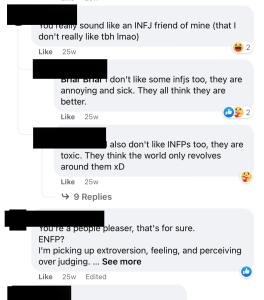5 Reasons Why You Might Be Confused About Your Myers-Briggs Type
Are you struggling to settle on a Myers-Briggs type? If so then this post is for you. I want to help you understand why. I’m going to give you 5 reasons why you might be confused:
- Tests are inaccurate
- Type descriptions don’t fit
- You’ve been given confusing theory
- You’ve been given bad examples
- You’ve been given bad feedback
#1. Test Are Inaccurate
Before I start criticizing tests, I first want to acknowledge that the development of the Myers-Briggs Type Indicator (or MBTI) was a huge breakthrough for which I owe a debt of gratitude.
The MBTI helped popularize Carl Jung’s theory of personality and has promoted the idea that we should be able to live lives that we’re well suited for. Isabel Briggs Myers introduced the test in the 1940s as a way to help women entering the workforce during World War II to land jobs that matched their personalities.
The theory that they popularized has helped me to understand myself and my family and ultimately to do more of what I love.
With this underlying gratitude, I’m going to point out some flaws…
Tests are inaccurate for several reasons:
It’s Impossible For Us To Be Objective About Ourselves

Some of us can do this better than others, but no one can be truly objective about themselves.
On some level it’s always going to be a sort of hall of mirrors. We’re conditioned by our parents, by society, by culture, etc. to see ourselves in different ways or to hide certain things from ourselves.
When I’ve written Myers-Briggs questionnaires myself, in the past, one of the things I would do when I was testing them out would be to have couples take them together. It was always interesting to hear how they perceived each other’s answers. It wasn’t uncommon to hear things like:
“What are you talking about? You’re nothing like that!”
Multiple Choice Questions Are Ambiguous
No matter how well-written a question is, it’s going to be somewhat ambiguous. For example, here’s an early question from the MBTI:
Do you:
(A) Very much enjoy stopping at soda fountains; or;
(B) Usually prefer to use your money for other things?
Of course it’s easy to pick on this as a sort of extreme example of what may come off as a silly question in hindsight, but it points to a problem that exists with virtually all questions:
People of all types could answer either way. The enjoyment of soda fountains isn’t type dependent.
Here’s one from the current MBTI:
In reading for pleasure, do you:
(A) Enjoy odd or original ways of saying things; or;
(B) Like writers to say exactly what they mean.
I would struggle with this question. I could go either way. Odd or original ways of saying things could be either stimulating or annoying. The writer saying what they mean could either be refreshing or boring.
This ambiguity is a still a problem for the official Myers-Briggs test, even though these questions have been thoroughly workshopped. You can bet this problem is likely to be worse for any random test you might take online.
Non-Type Related Factors Affect Our Answers
The underlying theory behind Myers-Briggs suggests that type is about how are brains are more or less wired rather than how people behave. Introverts can be socially confident and extraverts can be shy.
I know an extravert who has agoraphobia (fear of wide open spaces). It’s difficult for them to leave their home. You can imagine that this person wouldn’t answer test questions about, say, going to parties, like an extravert.
Study suggest that 50% to possibly even 75% of people who re-take the MBTI receive different results. Aside from those listed above, non-type related reasons may include:
- Increase or decrease in social confidence
- Change in environment
- Change in mood
- Trauma
- Conditioning
- Change of habits
- A pandemic 🙂
to name a few…
What’s better than a test? Learn about one-on-one video sessions here.
#2 Type Descriptions Don’t Fit
When an author writes a type description it’s important for it to be relatable. This, however, presents a problem. There’s a lot of variance within each type. People of the same type can be quite different.
In order for the description to be relatable to the highest number of people, it’s difficult to avoid describing observable behavior and playing to stereotypes. Many people, however, don’t fit the stereotype for their type and observable behavior will vary wildly. For example:
An INTJ might be:
- A rigid perfectionist or a total slacker
- A neat-freak or very messy
- Consistently on time or consistently late
- A daydreamer or a go-getter
- A staunch sceptic or a spacey mystic
If you don’t fit the mold for your type then you may well read descriptions of your type and find that they just don’t fit.
#3 You’ve Been Given Confusing Theory
I believe that if you really understand what Myers-Briggs theory is about, it’s generally not necessary to add complexity to it in order to understand a person’t type.
Some, such as Dario Nardi, for example, have done rigorous work to further develop our understanding of type. Dario uses EEG technology to show how type correlates to brain function. From his research he’s been able to mine clear insights.
This, however, is the exception and not the rule. Anyone can publish thoughts and theories about type and many do. There’s a lot of confusing theory passed around about things like function loops, subtypes and other modification of the theory. Some of it may have validity and some may not, however much of it adds to confusion.
#4 You’ve Been Given Bad Examples
Mis-typing is common. In fact, in my estimation, most celebrity type listings are inaccurate. The problem with this is that bad examples skew our internal “type radar”.
When I was first trained in Myers-Briggs profiling I became obsessed with the idea of typing and quickly and accurately as possible. In order to do that I recognized that I would need to hone the power of my intuition.
I knew that if I had hundreds of accurate examples of each type that my intuition would be on point. I’d be able to develop a feel for each type that would be both fast and accurate. I also knew that if I had a few bad examples thrown in that it would throw everything off.
(If you’d like to sharpen your intuition for type, then I recommend checking out some of the in-depth celebrity type breakdowns on the WhatType YouTube channel.)
#5 You’ve Been Given Bad Feedback
If you’ve looked for help with your type then chances are you’ve gotten confusing and conflicting responses… especially if you’ve done so on Facebook or in a public forum.
This is because of a phenomenon known as the Dunning-Kruger effect. From Wikipedia:
“The Dunning–Kruger effect is a cognitive bias whereby people with low ability at a task overestimate their ability.”

This is especially prominent in the Myers-Briggs community because type is a soft science. You can’t verify someone’s opinion about type the same way you can verify the answer to a math problem.
It’s easy for people to fall into the trap of feeling like typing people comes naturally. The truth is that it’s a skill that needs to be earned.
In my estimation it’s not something that many people can do well and no one I know who can is regularly jumping in to share their opinions on Facebook groups.
More often than not you’ll end up with well meaning people who are confident they’re right but who don’t agree with each other, only adding to the confusion.
Looking for clarity on your type? Learn about one-on-one video session here.

This Post Has 0 Comments